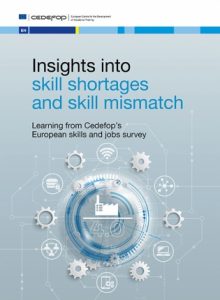
This publication analyses Cedefop’s European skills and jobs survey, a new data set covering about 49 000 EU-28 adult employees. Compiling different data insights, the report highlights that skill mismatch is a complex, multidimensional and dynamic phenomenon. It calls on policy-makers to adopt a different mindset for tackling skill mismatch, focused on sustainable activation, continuous learning, job-task reengineering and promotion of higher-end product market/managerial practices.
Source: Cedefop publication: Insights into skill shortages and skill mismatch | Cedefop

Skill shortages and skill mismatch are major concerns for policy-makers. The report calls on policy-makers to adopt a different mindset for tackling skill mismatch, focused on sustainable activation, continuous learning, job-task reengineering and promotion of higher-end product market/managerial practices.
With mass job destruction and sectoral restructuring following the recent economic crisis, four in 10 EU employers had difficulty finding people with the right skills, while unemployment rates peaked. Rapid digitalisation and technological skills obsolescence has also raised concerns about the extent to which the EU workforce is adequately prepared for the fourth industrial revolution. Yet, despite worries of increasing skill shortages and gaps, about 39% of adult EU employees are overskilled and trapped in low quality jobs. This publication analyses Cedefop’s European skills and jobs survey, a new data set covering about 49 000 EU-28 adult employees. Compiling different data insights, the report highlights that skill mismatch is a complex, multidimensional and dynamic phenomenon.
Downloads